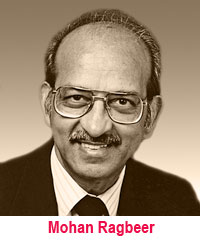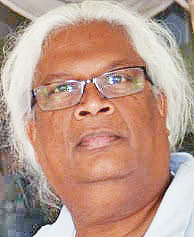Opinions
Apologies

pollute the airwaves daily, from Australia to Zimbabwe, are ours to endure; they will label us, whether we agree with them or not. Trudeau looked and sounded properly contrite in his apology to first nations of Newfoundland and Labrador. Nice. But can one equate his words with the human cost of centuries of theft, abuse, and sacrifice of lives, there and throughout the country, by Trudeau’s ancestors? I cannot claim exemption, because I have bought into the Canadian heritage and must share its ills, even though I might be denied many of its virtues, because of colour. The subsequent apology to the LGBT/Q community for criminalising them was quite emotional.
Now, can we expect America to begin the mammoth task of apologising to its victims: from the numerous massacred natives for four centuries, through countless campaigns against small and powerless nations worldwide, to the many decimations and regime changes and atrocities of the Cold War, led by its own and NATO’s forces, guided by international high finance (Bilderberg), to destroy stable regimes in Iraq, Libya, Palestine, Lebanon, Yugoslavia, Brazil etc., and destabilise others: Guyana, Honduras, Venezuela, Bolivia, Yemen, Somalia, sub-Saharan Africa, Syria, etc? Will that ever happen? Or will Britain apologise to India for stealing its assets?
Why must politicians engage in unethical or inhuman behaviour against their countrymen, just because of a difference in vision or philosophy? Should Trump’s power politics and sabre-rattling against North Korea, which merely seeks a weapon of deterrence, taint the majority of Americans, who simply want a quiet productive life, and to live amicably with their fellows, not the highly militarised one of corporate American greed and tyranny?
Does Trump have the moral strength to face a dwindling middle class, wilting under punitive taxes and splintered health care? Why should Theresa May get away with neglecting millions of Britain’s poor? Will she be elevated to the peerage, like Margaret Thatcher, for enhancing the privileges of aristocrats and the country’s wealthy? Will she apologise to Britain’s poor?
Now Australia, that former ace of chauvinism has finally been exposed for the smouldering tyrant it has been for much of its life, capsulized by its atrocities in the isle of Manus, where it has shown some of its nastiest behaviours.
How many remember when an anti-Chinese campaign raged last century in New South Wales against Chinese miners who extracted more gold than Anglo-Australian miners had? Whites agitated to send the Chinese either back home or to raise sheep. Reason for revolt? The Chinese worked longer and more diligently, and were willing to suffer greater hardships working more difficult or treacherous sites, which few Aussies wished to tackle. Dog-in-manger attitude par excellence!
The plea of live and let live is never-ending, and hardly, if ever, heard. The everlasting President Mugabe of Zimbabwe has come to an ignominious end, having usurped the country’s resources, breaking his own tenets and sacrificing his people for a grandiloquent lifestyle so far beyond any citizen’s, as to make even shame cringe in horror. How many apologies would he make; would he survive long enough to complete them? And what of his successor? Sadly, the history of Zimbabwe does not provide any assurance he would do any better than be a bridge to the future.
The structure of Africa’s ex-colonies, like others of recent Euro-empires, is marked by political, not human boundaries, which cut across tribal lands, and/or, as in Zimbabwe, include minority tribes, expediently incorporated into the colony. Tribal values and heritage run deep and create walls of distrust; yet minorities are expected to yield, while the majority rarely tolerates or gives allegiance to a minority leader, even one who is outstanding enough to win majority support. Colonial wounds are not well-enough healed yet to surmount tribal schisms, nor have we yet seen the kind of wisdom needed to unify previously warring tribes. Ask the Germans, three years younger than Canada, and among the last major Europeans to unite. The explosion of information and social media contributions has not done much yet to enhance human understanding, but we still hope.
Total focus needed driving back home
 Romeo Kaseram
Romeo Kaseram
My old man was an encyclopaedia of local wisdom, lecturing from his lifetime of experiences off the elevated podium that was the front passenger seat as he taught me to drive.
“Driving here is not like driving ‘Away’,” he said, comparing local driving conditions to the presumed courtesy practised by drivers on distant, well-maintained, and foreign roads. “Here you don’t come to a complete stop at ‘Stop’ signs and wave to someone else to go ahead. You roll right through looking left, right, and don’t forget to look above.”
I said, “Above? Why do I have to look above when coming to a ‘Stop’ sign?” I
did not take my eyes off the centre of the road ahead, where I had been told yet again with subdued impatience to glue my driving gaze. He replied, “In this place, you never know what is coming at you from any direction. That is why you have to look left; then you look right; and then you look above to make sure a coconut, or a ten-pound Graham mango, isn’t going to fall and mash-up your front glass. Driving here is not like ‘Away’. You have to negotiate mango trees, coconut trees, and sometimes a cricket ball flying out of the Oval when either Kanhai or Kallicharan is battling Lillie. Anything could come out from right, left, centre, and from above. So you drive forward on the road, but at all times you protect the vehicle!”
I understood from what my old man was saying he had witnessed a towering six smashing into someone’s front glass, the ball careening out of the Oval during those cricketing heydays when the two West Indian batsmen dominated world cricket.
He continued, nonchalantly, “Also, you have to look down.”
“So I have to look left, right, up, and now down? Why do I have to look down?”
My old man shook his head with a mix of sagacity and remorse, more and more convinced my genetics had been acquired from my mother’s side of the family. Cramped in the passenger seat, with knees at times ramming against the glove compartment when I braked awkwardly, my questioning appeared to cause him mental knocks as well.
“There are hardly roads here without potholes,” he said wearily. “And don’t trust manhole covers, so don’t drive over these if you can’t avoid it. You never know when it could give way under the weight of the car.”
It seemed with the great power of driving came great responsibility, this occurring through many unknown hazards within unseen spaces to the right, left, above and below the rubber hitting the road. To say the least, I was beginning to think to be a competent driver meant enabling and then refining a hidden ‘spidey-sense’, and the only way to master this sixth sense was to put in the ten thousand hours it takes to refine any art.
Also, my admiration was climbing for my old man, he now appearing to be not only a vast, encyclopaedic storehouse of raw road-sense about driving pitfalls, but was also an artist in the field of driving, similar to Van Gogh or Cezanne in their world of painting.
So, since I was being uplifted, and felt I was becoming more competent and confident shifting the gears in the old man’s prized car, so it did not grind metal-on-metal, and grated deeply on his nerves, causing him to widen his eyes with malevolent episodes of glaring followed by potent Zen moments of self-controlling silences, I said with the preamble unstated in my mind, to wit, “Oh wise one”, but instead asked out loud: “What do you do when you come to a ‘Yield’ sign?”
Not surprisingly, he was totally at a loss: it had never occurred to him, and the other drivers he tangoed with in zany and convoluted dances in dense traffic at intersections, to defensively yield to oncoming and hurtling vehicles.
In my mind this was a total validation of a driver so versatile he could easily slip in and out of ‘The Zone’, capable of negotiating the vehicle effortlessly out of tight spots without even blinking an eyelid.
A flutter of feathers, a squawk, and a chicken crossed our path elevated on two legs and leaning into the wind like a dinosaur pursuing prey. My old man lifted a calming palm.
“Always look through the corner of your eyes. Always be watchful for fowls chasing cockroaches; then sometimes a dog gets it into his head that he wants to chase a car to catch it and take a spin ’round the Roundabout. Always be on the alert – so you look left, and you look right; you have to look up and you look down; and watch like a mongoose out of the corner of both eyes. Do you think you’re ready to go do the test for your driver’s licence?”
I replied hesitatingly, saying I would try my best.
“Don’t worry!” he said. “I know a Licencing Officer always willing to ‘help out’. Watch and learn: I also know how to drive a good bargain.”
